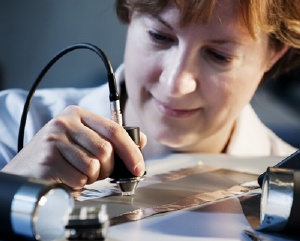Jul 21 2009
Development of high-performance batteries is an indispensable prerequisite for the economic efficiency of electric cars. For Germany to reach a top level in international electrochemistry research again, the Federal Ministry of Education and Research (BMBF) is now funding a consortium of selected universities and non-university research institutions in southern Germany. This consortium is coordinated by Forschungszentrum Karlsruhe and will be granted EUR 20 million from the Economic Stimulus Package II.
 Many steps on the way from the material to the battery: The photo shows the measurement of thickness of a newly coated electrode. Photo by: Sandra Göttisheim)
Many steps on the way from the material to the battery: The photo shows the measurement of thickness of a newly coated electrode. Photo by: Sandra Göttisheim)
"To fully use the potentials and chances of electromobility in Ger-many, it is required to strengthen electrochemistry research", underlines Federal Minister of Research Professor Annette Schavan. "We have chosen locations that already possess the relevant competence. Our focus is on enhancing strengths."
The "Consortium South of the Electrochemistry for Electromobility Initiative" consists of ten universities and research institutions in southern Germany, which act as equal partners. Apart from Forschungszentrum Karlsruhe and Universität Karlsruhe that are presently merging to the KIT, the partners are the Technische Universität Bergakademie Freiberg, Justus-Liebig-Universität Gießen, the Technical University of Darmstadt, the University of Ulm as well as IFW Dresden, the Max Planck Institute for Solid-State Research, Stuttgart, the German Aerospace Center, Stuttgart, and the Center for Solar Energy and Hydrogen Research of Baden-Württemberg, Ulm.
"We have succeeded in composing within a short period of time a strong research consortium of partners with vast experience in this field. Our efforts have been worthwhile. Now, we will start to jointly work on great challenges", explains Professor Horst Hahn from the KIT Institute of Nanotechnology, who coordinates the Consortium South.
In spite of the success in improving lithium ion batteries, the energy stored in 100 kg of the best batteries so far is sufficient for driving about 100 km with an electric vehicle only.
According to the Chairman of the Executive Board of Forschungszentrum Karlsruhe, Professor Eberhard Umbach, research on high-performance energy storage therefore is essential for our future energy supply. Umbach is responsible for the overall coordination of funding actions under the Economic Stimulus Package II, which are aimed at establishing two competence centers in the North and South of Germany. "The Helmholtz Association was asked by the BMBF to organize the application procedure and administrate the budget", says Umbach. "We are very pleased to fulfill this task, as energy stores play a central role. For two years now, we have been intensifying battery research at Karlsruhe."
The consortium will now focus on the development of new battery materials to produce cells of increased energy density and power density. Reliability, cycle life, and quick charge and discharge will also play an important role. Progress in these fields will be required for electric cars driving on future roads. In addition, electrochemical topics, for instance, interface phenomena and charge transport, will be studied. To perform this work, the funds from the Economic Stimulus Package II will be used first to complement the equipment of the partners with modern instruments for the fabrication and char-acterization of materials and cells.
In addition to networking for competence building, specific promotion of young scientists in the growing battery and cell sector is another important objective of the consortium.
Professor Werner Tillmetz, Member of the Executive Board of the Center for Solar Energy and Hydrogen Research (ZSW), Ulm, and scientific spokesman of the new consortium, is sure that this close cooperation of various institutions will eventually lead to success: "We will combine various aspects of fundamental research with application-oriented activities. This is the only way to transfer new findings in materials research to products on the market."
The Karlsruhe Institute of Technology (KIT) is the merger of the Forschungszentrum Karlsruhe, member of the Helmholtz Asso-ciation, and the Universität Karlsruhe. This merger will give rise to an institution of internationally excellent research and teach-ing in natural and engineering sciences. In total, the KIT has 8000 employees and an annual budget of 700 million Euros. The KIT focuses on the knowledge triangle of research - teaching - innovation.
The Karlsruhe institution is a leading European energy research center and plays a visible role in nanosciences worldwide. KIT sets new standards in teaching and promotion of young scien-tists and attracts top scientists from all over the world. More-over, KIT is a leading innovation partner of industry.